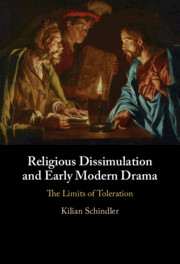Religious Dissimulation and Early Modern Drama
The Limits of Toleration
- Author: Kilian Schindler, Université de Fribourg, Switzerland
- Date Published: September 2023
- availability: Not yet published - available from October 2024
- format: Hardback
- isbn: 9781009226318
$
110.00
Hardback
Other available formats:
eBook
Looking for an inspection copy?
This title is not currently available for inspection. However, if you are interested in the title for your course we can consider offering an inspection copy. To register your interest please contact [email protected] providing details of the course you are teaching.
-
Kilian Schindler examines how playwrights such as William Shakespeare, Ben Jonson, and Christopher Marlowe represented religious dissimulation on stage and argues that debates about the legitimacy of dissembling one's faith were closely bound up with early modern conceptions of theatricality. Considering both Catholic and Protestant perspectives on religious dissimulation in the absence of full toleration, Schindler demonstrates its ubiquity and urgency in early modern culture. By reconstructing the ideological undercurrents that inform both religious dissimulation and theatricality as a form of dissimulation, this book makes a case for the centrality of dissimulation in the religious politics of early modern drama. Lucid and original, this study is an important contribution to the understanding of early modern religious and literary culture. This title is also available as Open Access on Cambridge Core.
Read more- Analyses how the phenomenon of religious dissimulation shaped early modern drama and conceptions of theatricality, offering insight into the religious politics of the early modern theatre
- Offers a comprehensive account of how religious persecution in early modern England drove Catholics as well as Protestants to dissemble their beliefs and affected drama from a wide range of ideological perspectives that operated at the heart of early modern culture and literature
- Suggests new and original ways of thinking about the representation of religious toleration on the early modern stage and the religious politics of the medium of the theatre itself
- This title is also available as Open Access on Cambridge Core.
Reviews & endorsements
'We all know that many had an anti-theatrical prejudice in Renaissance England. Kilian Schindler's learned and persuasive new book argues that we have been thinking about the issue in the wrong way. Hostility to the theatre was centred on drama's shape-shifting nature, the ways in which plays represented people in disguise and, by implication, able to evade the authorities. Accordingly, anxiety about the theatre was centred on questions of what could be tolerated, what had to be revealed and how honest ordinary citizens should be in times of religious persecution. Was outward conformity enough? Or should there be a window into the hearts of men and women? As enjoyable to read as it is challenging, Religious Dissimulation and Early Modern Drama is a thought-provoking work that has much to teach us about Shakespeare, Jonson, Marlowe and other early modern dramatists, and the conditions under which English commercial theatre was established.' Andrew Hadfield, University of Sussex
See more reviews'Dissembling, hypocrisy, equivocation: these are some of the fears that arose from the Reformation. The local politics surrounding issues of religious conformity produced a general anxiety that outward appearances could not be trusted. People might not be what they seem or say what they believed. Despite the cultural centrality of religious dissimulation, there has not been a sustained study of this topic until now. Kilian Schindler's book deftly takes us into the nuances and complexities of attitudes towards dissimulation. With learned depth, stylistic clarity, and fresh readings of familiar plays, Schindler masterfully explores the intersection of dissimulation and theatrical performance in early modern England.' Kristen Poole, University of Delaware
Customer reviews
Not yet reviewed
Be the first to review
Review was not posted due to profanity
×Product details
- Date Published: September 2023
- format: Hardback
- isbn: 9781009226318
- length: 292 pages
- dimensions: 235 x 158 x 21 mm
- weight: 0.56kg
- availability: Not yet published - available from October 2024
Table of Contents
Introduction
1. Religious dissimulation and toleration in early modern England
2. From Oldcastle to Falstaff: the politics of martyrdom and conformity in 1 and 2 Henry IV
3. Falstaff revisited: Puritan nonconformity and loyal dissent in 1 Sir John Oldcastle
4. Silence denied: Sir Thomas More and the incrimination of inward dissent
5. Free speech and neo-stoicist inwardness: the divided delf in Ben Jonson's Sejanus His Fall
6. Exposing religious dissimulation: the stage Machiavel in Christopher Marlowe's The Jew of Malta
7. Semi-conformity, idolatrous pollution, and conversion: the permeable self in Ben Jonson's Bartholomew Fair
Conclusion.
Sorry, this resource is locked
Please register or sign in to request access. If you are having problems accessing these resources please email [email protected]
Register Sign in» Proceed
You are now leaving the Cambridge University Press website. Your eBook purchase and download will be completed by our partner www.ebooks.com. Please see the permission section of the www.ebooks.com catalogue page for details of the print & copy limits on our eBooks.
Continue ×Are you sure you want to delete your account?
This cannot be undone.
Thank you for your feedback which will help us improve our service.
If you requested a response, we will make sure to get back to you shortly.
×
